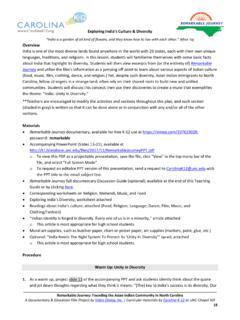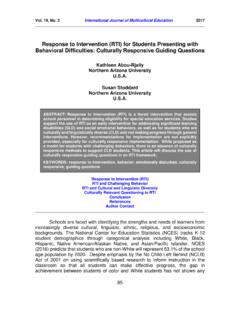Transcription of 11 Skills Toddlers Master Before Words Emerge Let’s Talk ...
1 11 Skills Toddlers Master Before Words Emerge From Let s Talk About Talking at Laura Mize, , CCC-SLP SKILL How This Looks Why It s Important Beginning Strategies Skill # Reacts to events in the environment Child consistently reacts to things he sees, hears, and feels. Responding is the foundation for interacting and communicating. Help a child learn to use his senses to explore things in his/her world. Offer new experiences often. Use toys the child can look at, listen to, hold, mouth, and explore. Skill # Responds to people when they talk to or play with him or her Child enjoys being around other people and responds to them consistently. Communicating always involves at least two people. When kids don t respond, it s one-sided. Don t let a child check out or be alone for long periods.
2 Give him a reason to include you look and sound FUN! Position yourself so he will make eye contact. Do what he likes as you play, play, play together! Prioritize and reward interaction. Skill # Takes turns with you during interactions Child participates in extended back & forth exchanges with others. Turn taking is how all of us become interactive and conversational. Treat his actions as if they are purposeful toward you. Play trading games with everyday objects & toys. Join in and take a quick turn while he s playing with toys so you re included. Skill # Develops a longer attention span Child stays with an activity for at least 5 minutes alone and even longer with adults. Attention is the gate-keeper for learning anything new, especially language. Warm up Before any teaching activity.
3 Movement activities help most Toddlers begin to pay attention. Start with interesting activities. Limiting screen time helps many Toddlers attend longer. Try the One More rule to extend attention. Skill # Shifts and shares joint attention with others Child shifts his attention between an object and you while you re sharing the same focus. Kids learn to understand Words and talk by listening to the important things other people want to share. Place yourself within a child s line of vision. Teach a child to show , hold, and give you objects during daily routines. Play games to teach him to look for you and look at what you re talking about. Point and gesture often to direct his attention. Skill # Plays with a variety of toys appropriately Child plays well with many different toys and uses familiar objects in everyday routines.
4 Children learn almost everything through playing. When they don t, they miss opportunities for language. Plan to play and stay with a child to show him what to do with a toy and guide him as he learns. Get face-to-face on the floor. Provide a variety of toys with various motor actions. Teach cognitive concepts. Limit self-stim triggers when alone. Skill # Understands early Words and follows simple directions Child completes many different requests consistently. A child must understand Words Before he or she can use those Words to talk and communicate. Stay together so that a child can link meaning with what you say. Keep your language simple and narrate daily events. Use Tell him, show him, help him cues. Teach a child to do his part during daily routines. Try deconstruction first. Skill # Vocalizes or makes sounds purposefully Child is noisy and gets your attention by using his or her voice.
5 No one learns to talk until he or she can produce sounds intentionally. Rather than Words , model lots of play sounds. Imitate any sounds he makes. A child may need to rev up Before he can vocalize. Change your space or materials to get new results. Skill # Imitates actions, gestures, sounds, and Words Child copies what he sees and hears other people do and say. Toddlers learn to talk by repeating what other people say. Don t start with Words ! Begin with actions, gestures, and easier sounds Before expecting a child to imitate Words . Set the stage with expectant waiting for imitation. Skill # Uses early gestures like waving and pointing Child communicates with you nonverbally. In typical development, gestures Emerge just Before Toddlers begin to say Words . Use lots of gestures as you talk.
6 Teach a child to imitate easy whole body movements first like jumping and dancing, and then early gestures like reaching, Give Me 5, waving, and shaking his head no Before teaching a toddler to point. Skill # Initiates interaction with others to get needs met or to play Child deliberately works to get your attention to meet his or her needs. We can t depend on other people to approach us or know what we want. Make the shift from initiator to responder. Look for when a child almost initiates and teach him to expand. Set up opportunities for a child to request using sabotage.






